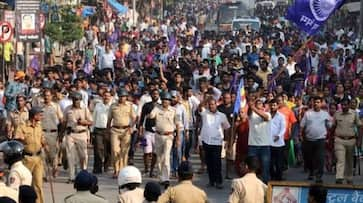The Bhima-Koregaon case has seen a lot of interference by the state government There has been a demand to drop cases against some of the activists, who have alleged Naxalite links It was only necessary then that the National Investigation Agency take over the case from Pune Police.
In a significant and much needed decision, the National Investigation Agency was directed to take over the Bhima-Koregaon case from Pune Police.
The Maharashtra government led by the Shiv Sena, NCP and Congress have questioned the decision and also expressed unhappiness over the same. The probe was being conducted by the Pune Police and the NCP has been demanding that the same be handed over to the SIT. There has also been a demand to drop cases against some of the activists, who have alleged Naxalite links.
The Bhima Koregaon case:
On January 1, 2018 violence had broken out near the Bhima-Koregaon war memorial at Pune. Dalits visit the memorial as it commemorates the victory of the British Forces including the Dalit Mahar soldiers over the Peshwa Rulers of Pune in 1818.
Following the violence that left one dead and several others injured, the Pune Police had filed a case against several activists and accused them of instigating violence. During the course of the investigation, it had come to light that these activists were closely linked to the Naxalites and had even plotted the assassination of Prime Minister Narendra Modi.
NCP was trying to weaken the probe:
Ever since the Shiv Sena took over with the help of the NCP and the Congress, there are allegations that the Maharashtra government has been trying to weaken the probe. It began with a tweet by NCP MLA, Jitendra Awhad, who said that those arrested in the Bhima-Koregaon case must be freed. They were booked on false cases. This is our government, Awhad had also said.
On Thursday, Maharashtra home minister Anil Deshmukh held a meeting with senior home department and police officials and spoke about re-investigating the case. The NCP chief, Sharad Pawar, had recently dashed off a letter to Maharashtra chief minister Uddhav Thackeray demanding a probe by the Special Investigation Team. He said that the erstwhile BJP government had abused power to book the activists and also added that the arrests were a conspiracy.
The need for an NIA probe:
In this case, there are multiple dimensions. Activists sympathetic towards the Naxalites, also described as urban Naxalites had been arrested from different parts of the country. There were arrests in Delhi, Mumbai, Hyderabad and Pune.
Further the chargesheet by the Pune Police clearly speaks about a larger conspiracy. Activists from across the nation were conspiring to destabilise the country. The police also spoke in detail about how these persons had conspired to assassinate the Prime Minister.
Considering the pan India nature of the case and the ramifications involved, it was only wise to tell the NIA to take over the probe.
The Pune Police would have had jurisdictional problems while trying to probe the case in other states. Further the Naxalite link would have also been hard for the Pune Police to probe. It is the NIA which has a pan India jurisdiction to probe cases. The agencies were formed with the specific intention of probing cases that had the involvement of multiple states. More importantly, this case has the Naxalite angle to it and the NIA is already probing several different cases relating to Maoist terror.
Further it also must be noted that there was a sustained effort by the NCP and Congress to weaken this case. Officials explained that this case has huge ramifications and hence the NCP’s politics over it was becoming dangerous.
The seriousness of the Bhima-Koregaon case:
In its 5,000-page chargesheet, the Pune Police said that the Naxalite backed conclave aggravated the violence at Bhima-Koregaon on January 1, 2018. It named 10 persons, which included activists, Surendra Gadling, Mahesh Raut, Shoma Sen, Rona Wilson and Sudhir Dhavle among others.
The chargesheet also named Naxalites, Dipak, Kisha Da, Prakash, Deepu and Manglu. The police said that Rona Wilson and Kishan Da, a fugitive was conspiring to assassinate the Prime Minister. They were planning on procuring arms and were in the process of waging a war against the country. Their larger conspiracy was to overthrow a democratically elected government.
Files of the Intelligence Bureau, which are in the possession of MyNation speaks about the larger conspiracy. These persons were trying to set up an urban base and planned on infiltrating the Indian Army as well as the corporate sector. The IB describes these persons as white collared infiltrators and were planning to recruit persons from the urban sector to propagate and carry out Naxalite related activity.
The plan to build an urban Naxal force has been in the works since early 2000. Many have managed to infiltrate the corporate sector, media and other government departments. The Bhima-Koregaon case was one such conspiracy but was busted by the Pune Police. If the probe into the case slows down, then these anti-national elements will be successful in their plans.
The powers of the NIA:
The NIA Act of 2008 was enacted to create the National Investigation Agency. The NIA has the powers to investigate and prosecute people for offences that affect the sovereignty, security, integrity of India.
The agency is responsible for the security of the state. Recently the Centre expanded the jurisdiction of the NIA. The NIA can take over cases if they fall under the offences mentioned in the schedule of the Act. There is no need for the Centre to seek the state’s permission as the law empowers the Centre to investigate the scheduled offences suo motu.
Last Updated Jan 25, 2020, 3:43 PM IST









![Salman Khan sets stage on fire for Anant Ambani, Radhika Merchant pre-wedding festivities [WATCH] ATG](https://static-gi.asianetnews.com/images/01hr1hh8y86gvb4kbqgnyhc0w0/whatsapp-image-2024-03-03-at-12-24-37-pm_100x60xt.jpg)
![Pregnant Deepika Padukone dances with Ranveer Singh at Anant Ambani, Radhika Merchant pre-wedding bash [WATCH] ATG](https://static-gi.asianetnews.com/images/01hr1ffyd3nzqzgm6ba0k87vr8/whatsapp-image-2024-03-03-at-11-45-35-am_100x60xt.jpg)


